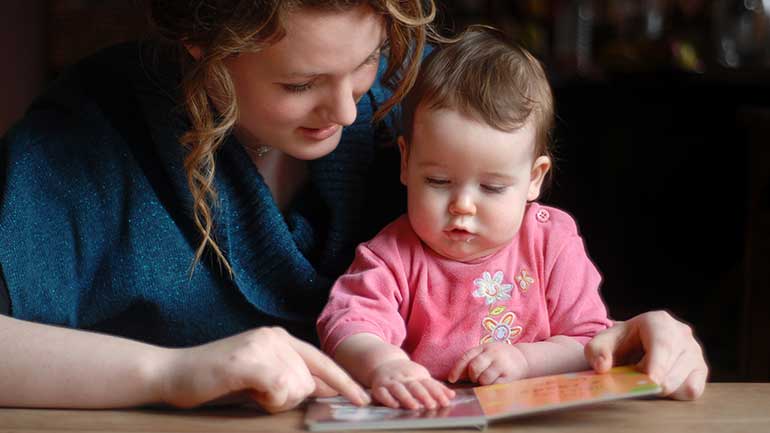
We've got tips for sharing books with your child to instill a lifetime love of reading.
We have all heard how important it is to read with our children, even when they are very young. Reading early and often helps build language and interaction skills and develops attention and vocabulary. Introducing children to books at an early age is linked to positive effects on reading, better problem-solving and a firmer understanding of numbers once a child is in school.
However, did you know that how you read with your child is just as important as how many and which books you read together? Research has shown that young children learn more when they actively communicate and play with an adult while reading, rather than just listening quietly or while falling asleep in bed. Children at different ages also learn from books in different ways.
Tips to keep in mind when sharing books with your child:
- You don’t need to read from cover to cover. Reading is a chance for a conversation and play so don’t worry if your child is only interested for a few pages. Focus on discussing a book’s pictures, rather than the specifics of the story. If they are fascinated by a certain picture, or want to hear part of the story over and over, go along with what they are interested in.
- You don’t need to do all the talking. While you are the one that knows how to read, if given the chance your child probably has lots to say about the book as well. Try waiting about five seconds before turning the page to give your child space to share something.
- You don’t need to administer a test. Use the book to have a conversation and not grill them with questions. Children get just as annoyed as adults when they are constantly asked questions. If you find that your child is losing interest as you read together, try making comments rather than asking questions. Rather than ask “What is it?” try making a comment “I like how it has fur!”
Here is a simple guide to how to switch up the way you read to suit each young child's age and stage.
|
Age |
Reading is about... |
The best books... |
|---|---|---|
|
0-6 months |
bonding and spending time together. I learn best from tone of voice, touch, and face-to-face play with an adult. |
are more like toys. Look for books with mirrors and things to touch and pull apart. I like large bright pictures with simple backgrounds. I am rough, so watch me carefully and see if you can find plastic or cloth books. |
|
7-12 months |
learning the meaning of new words. Be sure to point at and name pictures for me. Soon I will be able to point to pictures that you name! |
have one familiar picture per page, like animals, food, clothes and toys. I am still rough on books – if you don’t keep an eye on me I will eat them! |
|
12-24 months |
learning how to say new words and understanding new sentences. I am getting more interested in pictures and will often find and name pictures if you ask me. However, it is important that I hear new words from you so don’t ask me too many questions – I may just leave! I sometimes want to stay on one page for a long time, or skip ahead to the end of the story. |
have one familiar picture per page, like animals, food, clothes and toys. I am still rough on books – if you don’t keep an eye on me I will eat them! |
|
24 months + |
more and more and more new words! There are a few books that I love and will ask for over and over, but also keep introducing new books with longer stories and new vocabulary. |
can be short story books, or non-fiction books on animals, vehicles, places or different activities. As I begin to speak in longer sentences, see if I will start to tell you the story as I describe the pictures. |
For more information about parenting for children under two years old, please visit our Pregnancy and Baby pages.
